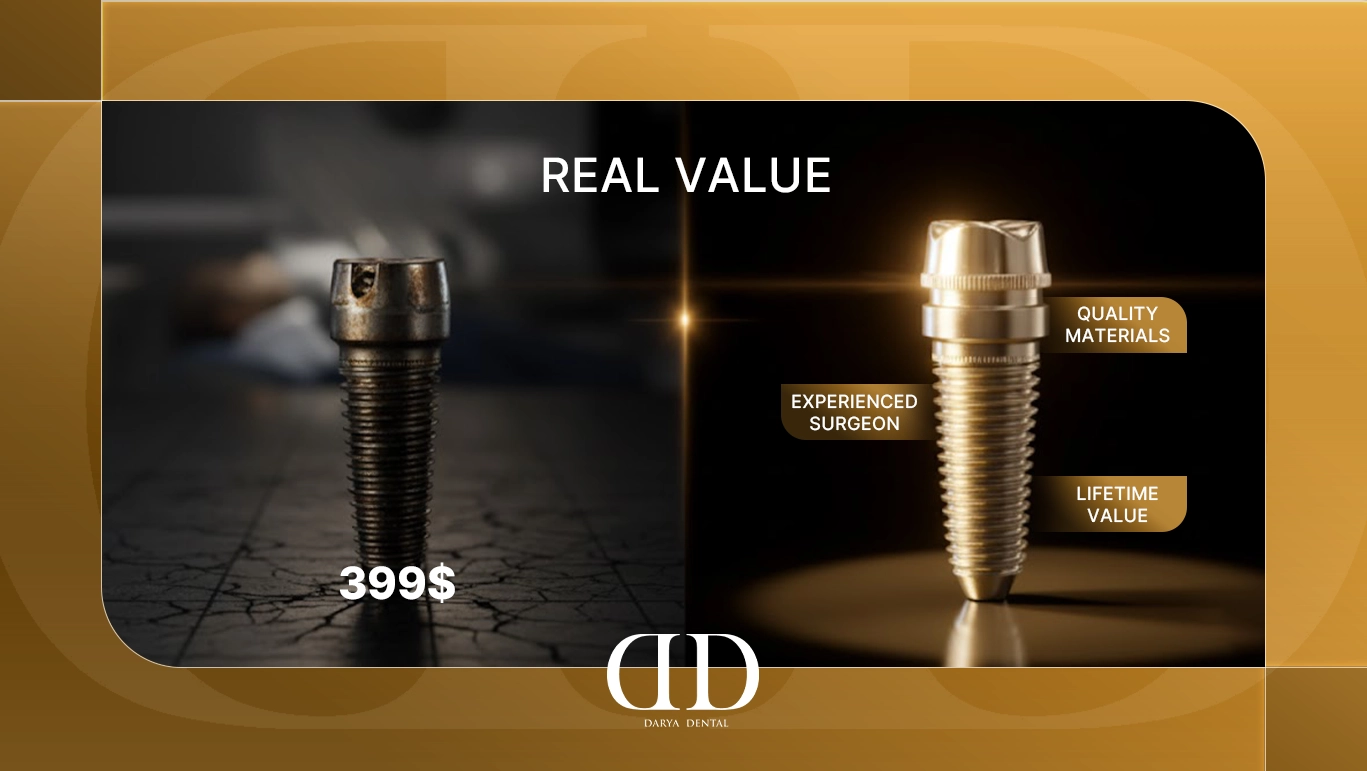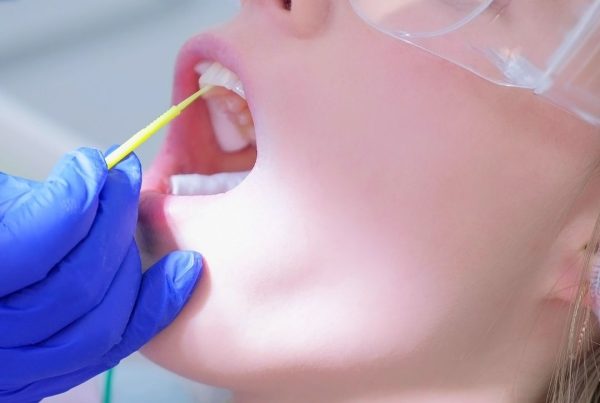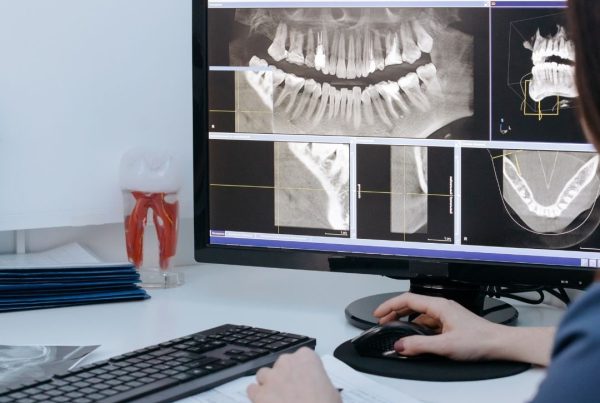You’ve seen the ads. Maybe they showed up in your Facebook feed, popped up on a billboard during your commute, or arrived as a glossy postcard in your mailbox. The promise is tantalizing: $399 dental implants—a solution to your missing tooth that costs less than a decent smartphone.
But here’s the question that should immediately follow: if standard dental implants typically cost $3,000-$6,000 per tooth in the United States, how can anyone offer them for $399? Is this legitimate, or are you walking into a situation where that advertised price is just the beginning of a much more expensive journey?
I’ve spent considerable time investigating the world of budget dental implants, talking to dentists, examining advertised offers, and researching international alternatives. What I’ve discovered is that $399 dental implants in the United States almost never mean what they appear to mean, while the same price point in countries like Turkey can actually deliver complete, quality implants. Understanding this distinction could save you thousands of dollars and significant frustration.
Let’s unpack the reality behind these budget implant advertisements, explore why the same price means completely different things in different locations, and help you find legitimate options for affordable dental implants without compromising on quality.
The Reality of $399 Dental Implants in the United States
When you see advertisements for $399 dental implants from US dental offices, you’re rarely looking at the complete picture. Let’s break down what these offers actually mean and why they’re structured this way.
What $399 Actually Covers in US Clinics
In the vast majority of cases, that $399 price represents only one component of a complete dental implant procedure. Here’s the typical breakdown:
The Implant Post Only: The advertised $399 usually covers just the titanium post that’s surgically placed into your jawbone. This is literally just one piece of a three-part system.
What’s NOT Included:
- Consultation and examination ($100-$300)
- X-rays and CT scans ($200-$500)
- Abutment (the connector piece): $300-$500
- Crown (the visible tooth): $1,000-$3,000
- Bone grafting if needed: $300-$3,000
- Tooth extraction if required: $150-$650
- Anesthesia and sedation: $200-$600
When you add up all the necessary components, that $399 dental implant suddenly becomes a $3,000-$5,000 procedure. The advertised price is essentially a loss leader designed to get you through the door.
Why US Clinics Use This Marketing Strategy
Dental offices understand that consumers respond to low advertised prices. By advertising the implant post alone at $399, they can technically claim truth in advertising while knowing that no patient will actually pay only $399 for a functional replacement tooth.
This isn’t necessarily deceptive—many clinics clearly state “starting at $399” or explain the additional costs. However, consumers often miss these details, leading to frustration when they discover the real investment required.
According to research on dental treatment decisions, understanding what’s included in advertised dental prices is crucial for making informed decisions about treatment.
Quality Concerns with Ultra-Budget US Implants
Even when you find a US provider offering genuinely low total costs for implants, serious quality concerns arise:
Inferior Materials: Budget implants may use lower-grade titanium or even titanium alloys that don’t integrate as well with bone.
Less Experienced Practitioners: Highly experienced implant specialists command premium fees. Extremely low prices often indicate less experienced dentists.
Corporate Dental Chains: High-volume, low-margin dental corporations may prioritize speed over precision, leading to higher failure rates.
Rushed Procedures: To make budget pricing work, some clinics rush through procedures, spending less time on precise placement and proper healing protocols.
Limited Warranties: Budget providers often offer shorter warranties or more restrictions on their guarantees.
The harsh reality is that in the United States, extremely low prices for complete dental implants almost always indicate compromised quality somewhere in the process.
Understanding Inexpensive Dental Implants: What You’re Really Paying For
When searching for inexpensive dental implants, it’s crucial to understand the components that affect cost and where you can reasonably save money without compromising outcomes.
The Anatomy of Implant Costs
A complete dental implant system consists of three main parts, each with associated costs:
| Component | US Typical Cost | What It Is | Where Costs Vary |
| Implant Post | $1,000-$2,000 | Titanium screw in jawbone | Material grade, brand |
| Abutment | $300-$500 | Connector piece | Custom vs. stock |
| Crown | $1,000-$3,000 | Visible tooth | Material, lab quality |
| Total | $2,300-$5,500 | Complete tooth replacement | Location, provider experience |
Additional procedures that affect total cost:
- Consultation & Imaging: Necessary for all cases
- Bone Grafting: Required for 40-50% of patients
- Sinus Lift: Needed for upper molars with insufficient bone
- Extractions: If you still have the damaged tooth
Where You Can Save Without Compromising Quality
Not all cost-cutting measures are problematic. Legitimate ways to reduce implant costs include:
Geographic Location: Dental care costs vary significantly by region. Urban areas and coastal cities charge 30-50% more than rural or Midwest locations.
Dental Schools: Teaching institutions offer implants at 30-50% discounts with supervision by experienced faculty. Treatment takes longer but quality is often excellent.
Dental Tourism: International destinations like Turkey, Mexico, or Costa Rica offer genuinely lower costs while maintaining quality—we’ll explore this thoroughly.
Timing: Some practices offer periodic discounts or financing promotions during slower seasons.
Insurance Optimization: If you have dental insurance, strategic timing and procedure coding can maximize coverage.
Searching for “$399 Dental Implants Near Me”: Setting Realistic Expectations
If you’re searching for $399 dental implants near me, here’s what you need to know before visiting these practices.
Questions to Ask When You Call
Don’t waste time with appointments until you understand the complete picture:
- “What exactly does the $399 include?”
- “What is the total cost for a complete implant, including crown and all fees?”
- “What brand of implants do you use?”
- “Do you offer written treatment plans before starting?”
- “What is your implant success rate?”
- “What warranty or guarantee do you provide?”
- “Are there any situations where the cost would be higher?”
Red Flags to Watch For
Certain responses should make you cautious:
Pressure Tactics: “This price is only good today” or aggressive same-day treatment pushing
Vague Answers: Inability or unwillingness to provide total cost estimates
Unknown Implant Brands: Quality implants come from established manufacturers (Straumann, Nobel Biocare, Zimmer)
No Written Estimates: Reputable practices provide detailed, written treatment plans
Too-Good-To-Be-True Guarantees: Lifetime warranties without clear terms or from unstable practices
Cash-Only Operations: Legitimate practices accept multiple payment methods
Alternative Search Strategies
Instead of searching specifically for the lowest advertised price, try:
- “Best value dental implants near me”
- “Experienced implant dentist” + your location
- “Dental implant reviews” + your city
- University dental school + your state
These searches will connect you with providers focused on quality and value rather than just the lowest sticker price.
The Cheapest Way to Get Dental Implants: A Comprehensive Analysis
What’s the cheapest way to get dental implants without compromising on quality? The answer depends on your specific situation, but several options deserve consideration.
Dental Schools and Teaching Hospitals
This option offers significant savings with quality oversight:
Advantages:
- 30-50% cost reduction compared to private practice
- Procedures performed by residents supervised by experienced faculty
- Access to latest techniques and technology
- Educational environment encourages thorough work
Disadvantages:
- Treatment takes significantly longer (multiple appointments)
- Less convenient scheduling
- Not available in all areas
- May not accept all insurance plans
Typical Costs: $1,500-$3,000 per implant (complete)
Dental Discount Plans
These aren’t insurance but can provide savings:
How They Work: Pay an annual membership fee ($100-$200) for access to reduced rates at participating dentists
Savings: Typically 10-60% off standard fees
Considerations: Limited provider networks, quality varies by participating dentists
Insurance Optimization
If you have dental insurance, maximize its benefits:
- Many plans cover 50% of implant costs up to annual maximums
- Strategic timing across calendar years can access two years of benefits
- Some procedures might be covered under medical insurance if medically necessary
International Dental Tourism
For many Americans, this represents the cheapest dental implants option while maintaining or even exceeding US quality standards. We’ll explore this thoroughly in the following sections.
Where Is the Cheapest Place to Get Dental Implants? A Global Perspective
Where is the cheapest place to get dental implants that offer genuine value? The answer increasingly points to international destinations, with Turkey emerging as a particularly compelling option.
Global Dental Implant Cost Comparison
| Country | Average Cost Per Implant | Quality Level | Travel Considerations |
| United States | $3,000-$6,000 | High (varies widely) | No travel needed |
| United Kingdom | $2,500-$4,500 | High | Language barrier: None |
| Turkey | $500-$1,200 | High (accredited clinics) | Popular destination |
| Mexico | $1,000-$2,500 | Variable | Close to US border |
| Thailand | $1,500-$3,000 | Generally high | Long distance |
| Costa Rica | $1,200-$2,200 | Good | Moderate distance |
| Hungary | $800-$1,500 | High | European destination |
Why Turkey Stands Out
Among international options, Turkey has emerged as the leading destination for dental implants, and for good reasons beyond just cost.
Studies on dental implant outcomes and quality highlight the importance of proper materials, experienced practitioners, and adherence to clinical protocols for successful implant integration.
$399 Dental Implants in Turkey: Understanding the Economics
Here’s where the story gets interesting: $399 dental implants in Turkey can actually represent a complete, quality implant—not just the post. How is this possible, and why doesn’t the same pricing indicate poor quality as it would in the United States?
The Economic Reality of Turkish Dental Care
Several factors enable Turkish clinics to offer genuinely affordable, high-quality implants:
Lower Operating Costs:
- Commercial real estate costs are 60-70% lower than major US cities
- Staff salaries, while competitive in Turkey, are lower than US dental industry wages
- Utilities, taxes, and overhead expenses are significantly reduced
Government Support:
- Turkish government actively promotes medical tourism as an economic strategy
- Tax incentives for medical tourism facilities
- Investment in healthcare infrastructure and education
Volume Economics:
- High-volume international patient flow enables economies of scale
- Clinics can invest in technology and training while maintaining lower prices
- Bulk purchasing of materials and implants reduces per-unit costs
Currency Advantages:
- The Turkish lira’s exchange rate creates favorable pricing for international patients
- What seems inexpensive to Americans represents good value in local economic context
Intense Competition:
- Hundreds of dental clinics compete for international patients
- Competition drives both quality improvement and price competitiveness
- Reputation is crucial, incentivizing excellent outcomes
What Makes Turkish $399 Implants Different
When a Turkish clinic advertises $399 implants, they typically mean:
Complete Package: Post, abutment, and crown included
Quality Materials: Use of established implant brands (often European)
Experienced Surgeons: Many Turkish implant dentists trained internationally
Modern Facilities: State-of-the-art equipment and sterilization
International Standards: JCI-accredited facilities meet global healthcare standards
Research demonstrates that Turkish dental implant success rates compare favorably with international benchmarks when procedures are performed at accredited facilities.
Why $399 Dental Implants in Turkey Are a Better Option
Let’s address this directly: why $399 dental implants in Turkey are a better option than similarly priced offers in the United States.
Quality at This Price Point
In the United States: $399 buys only the implant post, requires thousands more for completion, and even then, extremely budget pricing raises quality concerns.
In Turkey: $399-$800 often includes the complete system—post, abutment, and crown—from clinics meeting international quality standards.
Material and Brand Transparency
Turkish Clinics: Typically use established European implant brands (Straumann, Nobel, Zimmer, or quality European alternatives)
US Budget Providers: May use unknown brands or inferior materials to hit aggressive price points
Practitioner Experience
Turkey: The competitive medical tourism market means clinics invest heavily in experienced, often internationally-trained implantologists. Poor outcomes would destroy their international reputation and business model.
US Budget Clinics: Ultra-low US prices often indicate less experienced practitioners or high-volume corporate models prioritizing speed over precision.
Facility Standards
Top Turkish dental clinics serving international patients typically feature:
- JCI (Joint Commission International) accreditation
- Modern sterilization and infection control
- Digital dentistry technology (3D imaging, CAD/CAM)
- English-speaking staff
- Concierge services for international patients
Warranty and Follow-up
Reputable Turkish clinics understand their business depends on international patients’ satisfaction:
- Comprehensive warranties (often 5-10 years or lifetime)
- International follow-up protocols
- Partnerships with dentists in patients’ home countries
- Commitment to addressing any issues
According to research on medical tourism and patient safety, successful medical tourism providers differentiate themselves through quality assurance, international accreditation, and comprehensive patient support systems.
Difference Between $399 Dental Implants in Turkey vs in USA
The difference between $399 dental implants in Turkey vs in USA extends beyond geography—it represents fundamentally different value propositions.
What You Actually Get
US $399 Offer:
- Implant post only
- Total cost: $3,000-$5,000 after all components added
- Quality questionable at true budget completion
- Standard US warranty terms
Turkey $399-$800 Package:
- Complete implant (post, abutment, crown)
- All consultations, X-rays, and follow-ups included
- Quality materials from established manufacturers
- Comprehensive warranty
- Often includes some accommodations or transfers
The Total Investment Comparison
Let’s look at realistic total costs:
US Budget Implant (Complete):
- Advertised: $399
- Actual total: $3,000-$5,000
- Travel: $0 (local)
- Grand Total: $3,000-$5,000
Turkish Implant Package:
- Implant package: $500-$1,200
- Round-trip flights: $600-$1,200
- Hotel (5-7 days): $300-$700
- Meals and expenses: $200-$400
- Grand Total: $1,600-$3,500
Even including international travel, the Turkish option often costs less than the US procedure alone—and typically with comparable or superior quality at accredited clinics.
Quality Indicators Comparison
| Factor | US $399 Offer | Turkish $399-$800 Package |
| What’s Included | Post only | Complete implant |
| Total Real Cost | $3,000-$5,000 | $1,600-$3,500 (with travel) |
| Materials | Often lower grade | Established brands |
| Facility Standards | Variable | Often JCI-accredited |
| Practitioner Experience | Often limited | Often extensive |
| Technology | Standard | Typically modern/digital |
| Warranty | Limited | Comprehensive |
Finding the Best Price for Dental Implants Without Compromising Quality
How do you find the best price for dental implants while ensuring you receive quality care? Here’s a strategic approach.
Evaluating US Options
If you prefer domestic treatment, focus on value rather than lowest price:
Research Credentials:
- Look for Board Certified Prosthodontists or Oral Surgeons
- Check years of experience specifically with implants
- Review before-and-after photos
- Read multiple patient reviews across platforms
Understand Total Costs:
- Request complete written treatment plans
- Clarify what’s included and what costs extra
- Ask about potential additional costs (bone grafting, etc.)
- Get estimates from multiple providers
Verify Implant Brands:
- Insist on knowing specific brand and model
- Research the implant system’s track record
- Prefer established manufacturers with long-term data
Evaluating International Options
For Turkish or other international providers:
Accreditation Verification:
- Confirm JCI or ISO certification
- Check credentials of specific dentists
- Verify professional association memberships
Communication Assessment:
- Test responsiveness and English proficiency
- Request detailed treatment plans in writing
- Ensure clear understanding before traveling
Review Analysis:
- Look for reviews from patients in your country
- Check multiple platforms (Google, Trustpilot, specific medical tourism sites)
- Be wary of exclusively positive reviews or obvious fakes
Warranty Clarity:
- Understand warranty terms in detail
- Know how issues would be addressed
- Verify the clinic’s longevity and stability
Best Price on Dental Implants: Realistic Expectations
The best price on dental implants balances cost and quality:
In the United States: Expect to pay $2,500-$4,000 for quality work outside major metropolitan areas, potentially less at dental schools
Internationally (Turkey): $500-$1,200 per implant at accredited clinics, including all components
Total Cost with Travel (Turkey): $1,600-$3,500 for single implants including travel; even more economical for multiple implants
The Cheapest Dental Implants: Warning Signs and Red Flags
While seeking the cheapest dental implants, watch for warning signs indicating you should walk away:
Universal Red Flags (Any Location)
- Unwillingness to provide written estimates
- Pressure to commit immediately
- Can’t or won’t specify implant brands
- No clear warranty or guarantee
- Extremely negative or no online reviews
- Facilities that appear outdated or unclean
- Practitioners unable to show credentials
Specific US Red Flags
- “Too good to be true” complete implant prices (under $1,500 total)
- High-pressure sales tactics common in corporate dental chains
- Bait-and-switch pricing structures
- Practitioners who primarily do general dentistry, not specialists
Specific International Red Flags
- No international accreditation
- Can’t provide references from patients in your country
- Poor English communication if that’s your language
- Unwillingness to share credentials or training background
- No clear follow-up plan for after you return home
- Requests for full payment well in advance
According to research on dental implant success factors, proper patient selection, surgical technique, and post-operative care are crucial for implant success, regardless of cost.
Making Your Decision: US vs International Implants
Deciding between domestic and international $399 dental implants (or any affordable implants) requires weighing multiple factors.
Choose US Treatment If:
Medical Complexity: You have conditions requiring close monitoring
Time Constraints: You can’t take a week off for travel and recovery
Strong Local Insurance: Your coverage makes US treatment affordable
Comfort Level: International medical care causes significant anxiety
Legal Concerns: You want clear legal recourse in your jurisdiction
Simple Geography: You live far from international airports, making travel cumbersome
Consider Turkish Treatment If:
Multiple Implants Needed: Savings multiply dramatically with multiple procedures
Limited or No Insurance: You’re paying out of pocket anyway
Flexible Schedule: You can dedicate a week to travel and treatment
Comfortable with International Travel: You’re experienced or excited about travel
Research-Oriented: You’re willing to thoroughly vet international providers
Budget-Conscious: You want quality care at significantly lower costs
Hybrid Approach
Some patients use a combination strategy:
- Get complex procedures (extractions, bone grafting) done locally
- Travel internationally for implant placement
- Return to local dentist for final crown placement
- Maintain follow-up care domestically
This approach requires coordination but can optimize both cost and convenience.
Practical Steps for Pursuing Affordable Quality Implants
Regardless of which path you choose, follow these steps to maximize value and minimize risk:
Step 1: Comprehensive Consultation
Get thorough evaluation including:
- Full dental examination
- 3D CT scan or panoramic X-ray
- Bone density assessment
- Overall health evaluation
- Complete treatment plan with all potential costs
Step 2: Insurance Investigation
If you have coverage:
- Understand your specific implant benefits
- Learn annual maximums and how they apply
- Investigate whether international treatment qualifies for any reimbursement
- Consider timing procedures across calendar years to maximize benefits
Step 3: Provider Research
For domestic providers:
- Consultation with at least 2-3 dentists
- Verification of credentials and experience
- Review of multiple patient testimonials
- Written treatment plans for comparison
For international providers:
- Research 3-5 highly-rated clinics
- Verify accreditation and credentials
- Review international patient testimonials
- Understand complete package costs
Step 4: Financial Planning
- Calculate total true costs including all components
- Factor in travel expenses for international options
- Explore financing options (CareCredit, payment plans)
- Consider dental discount plans if staying domestic
- Investigate HSA/FSA eligibility
Step 5: Quality Verification
Before committing:
- Confirm specific implant brand and model
- Verify warranty terms in writing
- Understand follow-up protocols
- Know how problems would be addressed
- Get everything documented
Step 6: Follow-up Planning
Ensure long-term success:
- Schedule follow-up appointments (domestic or remote for international)
- Maintain excellent oral hygiene
- Regular professional cleanings
- Monitor for any issues
- Keep all documentation for warranty purposes
The Future of Affordable Dental Implants
The landscape of affordable dental implants continues evolving in encouraging directions.
Emerging Trends
Increased Transparency: Pressure is mounting for clearer pricing in US dental care, potentially ending misleading “$399” advertising
Technology Advancement: Digital dentistry, 3D printing, and improved materials are gradually reducing costs while improving outcomes
International Standardization: Growing acceptance of international accreditation makes evaluating foreign providers easier
Insurance Evolution: Some insurers are beginning to recognize international care, particularly when domestic costs are prohibitive
Medical Tourism Maturation: The industry is professionalizing with better coordination, clearer quality standards, and improved patient protections
Innovation in Materials: Research into alternative materials and simplified techniques may eventually reduce implant costs across all markets
As these trends continue, the gap between advertised and actual prices may narrow, while international options become more mainstream and accepted.
Read more: The best dental implants brands
Conclusion: Finding Real Value in Dental Implants
The promise of $399 dental implants represents very different realities depending on where you’re looking. In the United States, it’s almost always a marketing tactic that leads to $3,000-$5,000 in actual costs—and when it’s not, the quality concerns are substantial. In Turkey and select other international destinations, similar or even lower prices can represent complete, quality implant packages at accredited facilities.
The key insights to remember:
US Budget Implants: Advertised $399 prices rarely include all necessary components. True budget-priced complete implants in the US often involve compromised quality.
Turkish Implants: Can genuinely offer complete, quality implants for $500-$1,200 at accredited clinics, with total costs including travel still below US prices.
The Quality-Cost Balance: Don’t sacrifice quality for the lowest price, but understand that high quality exists at various price points, especially internationally.
Due Diligence Is Essential: Whether domestic or international, thorough research, credential verification, and clear communication are non-negotiable.
Personal Factors Matter: The best choice depends on your specific health needs, financial situation, comfort level with travel, and quality priorities.
For many Americans, especially those needing multiple implants or lacking good insurance coverage, high-quality Turkish dental care represents the best price for dental implants without compromising outcomes. For others, the convenience and familiarity of domestic care justifies the higher cost.
Whatever you decide, base your choice on complete information, realistic cost comparisons, and thorough quality evaluation. Your smile is too important for shortcuts, but that doesn’t mean you should accept unnecessarily high prices when safe, affordable, quality alternatives exist. The world of dental care is more global than ever before, and informed patients can leverage this reality to receive excellent care at fair prices.






